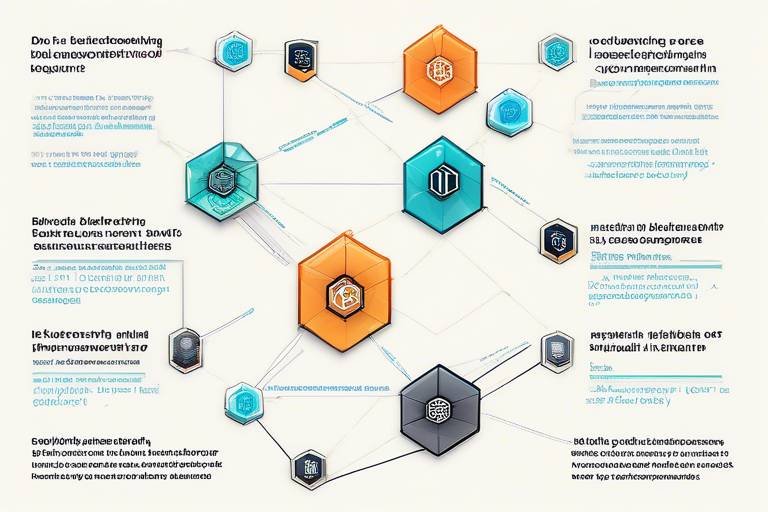How Blockchain Technology is Enabling Smart Contracts in Various Industries
In today's fast-paced digital world, the way we conduct business is undergoing a **massive transformation**. At the heart of this change lies blockchain technology, a revolutionary system that is not just a buzzword but a powerful tool reshaping various sectors. One of the most exciting applications of blockchain is the rise of smart contracts. These self-executing contracts are changing the game by automating processes, enhancing security, and reducing the need for intermediaries. But how exactly is blockchain enabling these smart contracts, and what does it mean for different industries? Let’s dive in!
To appreciate the impact of smart contracts, we must first understand the **foundation** they are built upon: blockchain technology. Think of blockchain as a digital ledger that records transactions across multiple computers in such a way that the registered information cannot be altered retroactively without the alteration of all subsequent blocks. This decentralization ensures that no single entity has control over the entire chain, fostering an environment of **transparency** and **trust**. In a world where data breaches and fraud are rampant, this level of security is invaluable. With blockchain, every transaction is visible to all parties involved, which not only enhances accountability but also significantly reduces the chances of disputes.
Now that we have a grasp on blockchain technology, let’s explore what smart contracts are. Simply put, smart contracts are self-executing contracts with the terms of the agreement directly written into lines of code. Imagine a vending machine: you put in your money, select your snack, and the machine automatically delivers it without any human intervention. Smart contracts operate on a similar principle. They automatically execute transactions when predetermined conditions are met, eliminating the need for intermediaries and reducing the risk of human error.
The advantages of smart contracts are numerous and compelling. They not only streamline processes but also offer significant benefits that can transform how businesses operate. Here are some key benefits:
- Cost Efficiency: By cutting out the middleman, smart contracts significantly lower transaction costs. This allows businesses to allocate resources more effectively, ultimately improving profitability.
- Speed and Automation: Smart contracts automate processes, leading to faster transactions and reduced delays. In industries where time is crucial, this can make a world of difference.
- Enhanced Security: With the use of cryptography, smart contracts are highly secure. This reduces the risk of fraud and ensures that all parties adhere to the terms of the agreement.
Imagine a world where every transaction you make doesn’t require a hefty fee paid to brokers or intermediaries. By leveraging smart contracts, businesses can **significantly lower transaction costs**. This means more money in their pockets and the ability to reinvest in growth opportunities. The elimination of these middlemen not only saves costs but also streamlines operations, allowing companies to focus on what they do best.
In the realm of business, **time is money**. Smart contracts automate processes that traditionally take days or weeks. For instance, in real estate transactions, smart contracts can expedite the transfer of property ownership by automatically executing the transfer once all conditions are met. This level of efficiency is not just a luxury; it’s becoming a necessity in today’s competitive landscape.
Despite their many advantages, implementing smart contracts is not without challenges. Issues such as **legal recognition**, **technical complexities**, and **security vulnerabilities** pose significant hurdles. For instance, the legal status of smart contracts is still a gray area in many jurisdictions, which can hinder their adoption. Additionally, the technical know-how required to create and manage smart contracts can be a barrier for many businesses. Addressing these challenges is crucial for the widespread acceptance and utilization of smart contracts.
Smart contracts are not confined to a single industry; they are being utilized across multiple sectors, showcasing their versatility. From finance to healthcare, the applications are vast and varied. Here are a few notable examples:
In the finance sector, smart contracts are revolutionizing transactions. They streamline processes such as loan approvals and compliance checks. Imagine applying for a loan where all your data is verified automatically, and the funds are released instantly upon approval. This not only enhances security but also opens the door for innovative financial solutions that were previously unimaginable.
Smart contracts improve transparency and traceability in supply chains. They ensure that all parties adhere to agreements, reducing the risk of fraud. For example, a smart contract can automatically release payments only when goods are delivered and verified, ensuring that everyone plays by the rules.
As blockchain technology continues to evolve, the future of smart contracts looks incredibly promising. We can expect developments that will further enhance their functionality and adoption across industries. With ongoing advancements in technology, smart contracts may become even more intuitive and user-friendly, making them accessible to businesses of all sizes.
- What is a smart contract? A smart contract is a self-executing contract with the terms directly written into code, automatically executing transactions when conditions are met.
- How does blockchain ensure security? Blockchain uses cryptography to secure transactions, making it highly resistant to fraud and tampering.
- What industries are using smart contracts? Smart contracts are being utilized in finance, supply chain management, healthcare, real estate, and many more sectors.

Understanding Blockchain Technology
Blockchain technology serves as the backbone for smart contracts, providing a decentralized and secure platform that ensures transparency and trust in transactions across various industries. Imagine a digital ledger that is not only immutable but also shared across a network of computers. This means every transaction is recorded in real-time, and once it's added to the blockchain, it cannot be altered or deleted. This transparency is what makes blockchain a revolutionary technology.
At its core, blockchain is composed of a series of blocks, each containing a list of transactions. When a block is filled, it is added to the chain in a linear, chronological order. This structure not only enhances security but also makes it easier to trace back through the history of transactions. To illustrate, consider the following components of a blockchain:
| Component | Description |
|---|---|
| Block | A container for a set of transactions. Each block contains a unique code called a hash. |
| Chain | A series of blocks that are linked together, creating a permanent record. |
| Node | Any computer that participates in the blockchain network, helping to maintain the ledger. |
| Smart Contract | A self-executing contract with the terms of the agreement directly written into code. |
One of the most compelling aspects of blockchain is its decentralization. Unlike traditional databases that are controlled by a single entity, a blockchain operates on a peer-to-peer network. This means no single party has control over the entire chain, which significantly reduces the risk of fraud and manipulation. Instead, every participant has access to the same information, fostering a sense of trust among users.
However, it’s important to note that while blockchain technology offers numerous advantages, it also comes with its own set of challenges. For instance, the energy consumption associated with maintaining a blockchain can be quite high, especially for large networks. Furthermore, the technical complexities involved in implementing blockchain solutions can be daunting for businesses unfamiliar with the technology.
In summary, understanding blockchain technology is crucial for grasping the transformative role it plays in enabling smart contracts. By providing a secure, transparent, and decentralized framework, blockchain not only enhances trust among parties involved in a transaction but also paves the way for innovative solutions across various sectors.
- What is blockchain technology? - Blockchain is a decentralized digital ledger that records transactions across many computers, ensuring that the recorded transactions cannot be altered retroactively.
- How do smart contracts work? - Smart contracts are self-executing contracts where the terms of the agreement are written into code, allowing for automatic execution when predefined conditions are met.
- What are the benefits of using blockchain? - Benefits include enhanced security, transparency, lower costs, and the elimination of intermediaries in transactions.
- What industries are utilizing blockchain technology? - Industries such as finance, supply chain, healthcare, and real estate are leveraging blockchain to improve efficiency and trust.

What are Smart Contracts?
Smart contracts are truly revolutionary tools in the digital landscape, acting as a bridge between traditional agreements and modern technology. Imagine a contract that automatically executes itself when certain conditions are met—this is the essence of a smart contract. These contracts are essentially self-executing agreements where the terms are directly written into lines of code. This means that once the contract is deployed on a blockchain, it operates independently, without the need for a middleman. It’s like having a digital vending machine: you put in your money (or meet the conditions), and out comes your item (or the agreed-upon outcome) without any fuss.
The beauty of smart contracts lies in their ability to automate processes. In a world where time is money, this automation can lead to significant efficiency gains. For instance, in a real estate transaction, a smart contract can automatically transfer ownership once the payment is confirmed, eliminating the lengthy processes usually involved. This not only speeds up the transaction but also reduces the chances of human error. Furthermore, because these contracts are stored on a blockchain, they are immutable and transparent, ensuring that all parties can trust the agreement without fear of tampering.
Let’s break down some key features that make smart contracts so appealing:
- Decentralization: Smart contracts operate on a decentralized network, meaning there’s no single point of failure. This enhances security and reduces the risk of fraud.
- Transparency: All transactions are recorded on the blockchain, allowing anyone involved to view the contract and its execution, fostering trust among parties.
- Efficiency: By automating tasks, smart contracts reduce the time and effort required to complete transactions.
- Cost Reduction: With no intermediaries needed, businesses can save on transaction fees and allocate resources more effectively.
However, while the promise of smart contracts is immense, it’s essential to understand that they are not a one-size-fits-all solution. Their effectiveness depends on the quality of the code and the clarity of the terms embedded within. In essence, a smart contract is only as good as the information it’s given. If the conditions are poorly defined or the code is flawed, it could lead to unintended consequences. Moreover, the legal recognition of smart contracts varies by jurisdiction, which can complicate their use in certain regions.
In conclusion, smart contracts represent a significant leap forward in how we conduct transactions and enforce agreements. They harness the power of blockchain technology to create a more efficient, transparent, and secure way of doing business. As we continue to explore their potential, it's clear that smart contracts will play a pivotal role in the future of various industries.

Benefits of Smart Contracts
Smart contracts are revolutionizing the way we conduct transactions and agreements, and their benefits are nothing short of astounding. Imagine a world where contracts execute automatically, without the need for intermediaries or lengthy negotiations. This is the reality that smart contracts bring to the table. One of the most significant advantages is cost efficiency. By eliminating the need for middlemen, businesses can drastically reduce transaction costs. Think about it: no more fees paid to lawyers, brokers, or notaries. This allows organizations to allocate their resources more effectively, enhancing their overall profitability.
Additionally, speed and automation are critical benefits that smart contracts provide. In traditional contract execution, delays can arise from various factors, including paperwork, approvals, and human error. Smart contracts automate these processes and execute transactions at lightning speed. For instance, in industries like finance, where timing is crucial, the ability to execute contracts instantly can be the difference between profit and loss. Imagine a stock trade that completes in seconds rather than hours—this is the kind of efficiency smart contracts offer.
Moreover, the enhanced security provided by blockchain technology cannot be overstated. Each transaction is recorded on a decentralized ledger, making it nearly impossible to alter or tamper with the contract once it’s executed. This built-in security feature not only protects sensitive information but also builds trust among parties involved in a transaction. When both parties know that the contract is immutable and transparent, it fosters a sense of confidence that is often lacking in traditional agreements.
Furthermore, smart contracts are inherently transparent. All participants in a transaction can view the contract and its execution status in real-time. This level of transparency reduces the likelihood of disputes, as everyone is on the same page. In sectors like supply chain management, for example, this transparency ensures that all parties adhere to agreed-upon terms, significantly reducing the risk of fraud and miscommunication.
To summarize, the benefits of smart contracts can be encapsulated in the following key points:
- Cost Efficiency: Reduces transaction costs by eliminating intermediaries.
- Speed: Automates processes for faster execution of contracts.
- Security: Provides enhanced security through blockchain technology.
- Transparency: Ensures all parties have access to the same information, reducing disputes.
As we continue to explore the vast potential of smart contracts, it is clear that they are not just a trend; they represent a fundamental shift in how we approach agreements and transactions across various industries. The combination of cost savings, speed, security, and transparency makes smart contracts an attractive solution for businesses looking to thrive in a competitive landscape.
1. What are smart contracts?
Smart contracts are self-executing contracts with the terms directly written into code, automating processes and reducing the need for intermediaries.
2. How do smart contracts improve efficiency?
They streamline transactions by automating execution, which speeds up processes and reduces delays.
3. Are smart contracts secure?
Yes, they leverage blockchain technology to provide enhanced security, making it difficult to alter or tamper with the contract.
4. In which industries are smart contracts used?
Smart contracts are utilized in various sectors, including finance, supply chain, healthcare, and real estate.

Cost Efficiency
One of the most compelling reasons businesses are turning to smart contracts is their ability to significantly enhance . By automating processes and removing the need for intermediaries, smart contracts can lead to substantial savings. Imagine a world where contracts are executed automatically without the need for lawyers or brokers—this is not just a dream; it’s a reality with blockchain technology!
When you think about traditional contracts, there’s usually a lengthy process involved. You have to engage various parties, pay for legal fees, and often deal with delays that can cost both time and money. Smart contracts streamline this entire process. They operate on a decentralized platform, which means that all parties involved can access the same information at the same time, eliminating the need for a middleman. This not only speeds up transactions but also reduces the overall costs associated with contract execution.
Consider the following points to understand how smart contracts can lead to cost savings:
- Elimination of Intermediaries: By cutting out middlemen, businesses can save on fees associated with brokers, lawyers, and other agents.
- Reduced Administrative Costs: Automating contract execution decreases the need for administrative oversight, allowing companies to allocate resources more efficiently.
- Minimized Errors: Smart contracts are programmed to execute based on predetermined conditions, reducing the chances of human error that can lead to costly disputes.
- Faster Transactions: The speed of execution translates to quicker cash flow, which is vital for maintaining a healthy business operation.
To illustrate the cost efficiency of smart contracts, let’s take a look at a simple comparison table:
| Traditional Contracts | Smart Contracts |
|---|---|
| Involves multiple intermediaries | Direct transactions between parties |
| High legal and administrative fees | Lower operational costs |
| Long processing times | Instant execution |
| High risk of disputes | Automated dispute resolution |
In summary, the cost efficiency of smart contracts is undeniable. They not only provide a more streamlined and automated approach to executing agreements but also pave the way for businesses to enhance their profitability. As more companies recognize these benefits, the adoption of smart contracts is likely to grow, transforming how industries operate and interact in the digital age.
What are smart contracts?
Smart contracts are self-executing contracts with the terms of the agreement directly written into code, allowing for automated execution without the need for intermediaries.
How do smart contracts save money?
By eliminating intermediaries, reducing administrative costs, and minimizing errors, smart contracts significantly lower transaction costs.
In which industries are smart contracts most beneficial?
Smart contracts are being utilized in various sectors, including finance, supply chain, healthcare, and real estate, showcasing their versatility.
Are smart contracts secure?
While smart contracts offer enhanced security through blockchain technology, they are not immune to vulnerabilities. Ongoing improvements and audits are necessary to mitigate risks.

Speed and Automation
When it comes to the world of business, speed is often the name of the game. Imagine a scenario where every second counts—like in financial trading or supply chain logistics. This is where smart contracts shine brightly, acting as the turbo boosters of the digital contract landscape. By automating processes, smart contracts eliminate the tedious back-and-forth that typically bogs down transactions. Instead of waiting days or even weeks for approvals and confirmations, smart contracts execute instantly once the pre-defined conditions are met.
Think of smart contracts as a vending machine: you insert your money, make your selection, and voilà! The machine delivers your snack without any human intervention. In the same way, smart contracts automatically execute transactions once the specified criteria are satisfied. This not only speeds up the process but also reduces the chances of human error, ensuring that everything runs like a well-oiled machine.
Moreover, the automation offered by smart contracts can lead to significant improvements in operational efficiency. Companies can redirect their resources—both time and manpower—toward more strategic initiatives rather than getting bogged down in routine tasks. For instance, in the real estate sector, property transfers can be completed almost instantaneously, allowing buyers and sellers to finalize deals without unnecessary delays.
To further illustrate this point, let's take a look at the following table that compares traditional contract execution timelines with those of smart contracts:
| Aspect | Traditional Contracts | Smart Contracts |
|---|---|---|
| Execution Time | Days to Weeks | Seconds to Minutes |
| Human Intervention | High | None |
| Error Rate | Higher | Lower |
| Cost of Execution | Higher due to intermediaries | Lower due to automation |
As you can see, the advantages of speed and automation in smart contracts are not just theoretical; they are backed by tangible data. This rapid execution not only enhances customer satisfaction but also positions businesses to respond swiftly to market changes, giving them a competitive edge.
In conclusion, the speed and automation provided by smart contracts are game changers in various industries. They allow businesses to operate more efficiently, reduce costs, and improve overall service delivery. As we continue to embrace this technology, the potential for even greater advancements in speed and automation is limitless.
- What exactly is a smart contract?
A smart contract is a self-executing contract where the terms are directly written into code, allowing for automated transactions without the need for intermediaries.
- How do smart contracts ensure security?
Smart contracts are built on blockchain technology, which provides a decentralized and secure environment that is resistant to tampering and fraud.
- Can smart contracts be used in any industry?
Yes, smart contracts can be applied in various sectors, including finance, healthcare, supply chain, and real estate, showcasing their versatility.
- What are the main challenges facing smart contracts?
Some challenges include legal recognition, technical complexities, and security vulnerabilities that need to be addressed for broader adoption.

Challenges in Implementing Smart Contracts
While smart contracts hold immense potential to revolutionize various industries, their implementation is not without significant challenges. One of the foremost issues is the legal recognition of smart contracts. Many jurisdictions still grapple with the legal status of these digital agreements, which can create uncertainty for businesses looking to adopt this technology. Without clear legal frameworks, companies may hesitate to fully embrace smart contracts due to fears of non-enforcement or disputes over contract terms.
Another critical challenge lies in the technical complexities associated with developing and executing smart contracts. Writing code that accurately reflects the terms of an agreement requires a high level of expertise. Even minor errors in the code can lead to unintended consequences, and once a smart contract is deployed on the blockchain, it can be challenging to modify or reverse it. This raises concerns about the reliability of automated processes, as bugs or vulnerabilities could be exploited by malicious actors.
Moreover, the security vulnerabilities inherent in blockchain technology itself pose a risk. Although blockchain is often touted for its security features, it is not immune to attacks. For instance, if a smart contract interacts with external data sources, known as oracles, any inaccuracies or manipulations in that data can compromise the integrity of the contract. This highlights the need for robust security measures and thorough testing before deploying smart contracts in real-world scenarios.
Additionally, the interoperability of smart contracts across different blockchain platforms presents another hurdle. Currently, many blockchains operate in silos, which limits the ability of smart contracts to interact seamlessly with each other. This lack of standardization can hinder collaboration between businesses and industries, making it difficult to realize the full potential of smart contracts.
Lastly, there is a cultural resistance within organizations to adopt new technologies. Many businesses are accustomed to traditional contract processes and may be reluctant to change, fearing the unknowns associated with smart contracts. This resistance can slow down the adoption of smart contracts, even in industries where the benefits are clear.
In summary, while smart contracts promise to streamline operations and enhance efficiency, their implementation is fraught with challenges. Addressing legal, technical, security, interoperability, and cultural issues is crucial for businesses to fully leverage the capabilities of smart contracts and unlock their potential benefits.
- What are smart contracts?
Smart contracts are self-executing contracts with the terms directly written into code, automating processes and reducing the need for intermediaries. - How do smart contracts improve efficiency?
By automating processes and eliminating intermediaries, smart contracts reduce transaction costs and speed up execution times. - What challenges do smart contracts face?
Challenges include legal recognition, technical complexities, security vulnerabilities, interoperability issues, and cultural resistance within organizations. - In which industries are smart contracts being used?
Smart contracts are being utilized in finance, supply chain management, healthcare, real estate, and more.

Applications in Various Industries
The impact of smart contracts, powered by blockchain technology, spans across a multitude of industries, revolutionizing traditional practices and enhancing operational efficiency. In finance, for instance, smart contracts are not just a trend; they are reshaping the landscape of banking and investment management. Imagine a world where transactions can occur without the need for intermediaries, where compliance is automated, and where the risk of fraud is significantly minimized. This is not a distant dream but a current reality in many financial institutions. By automating processes and ensuring transparency, smart contracts allow for quicker settlements and lower costs, which is a win-win for both businesses and consumers.
Moving on to the supply chain sector, we witness another powerful application of smart contracts. Here, they serve to enhance transparency and traceability, which are crucial in a world where consumers are increasingly demanding accountability from brands. With smart contracts, every transaction can be logged on the blockchain, providing an immutable record that verifies the authenticity of products. This means that if a company claims its goods are ethically sourced, it can prove it. Imagine being able to trace the origin of your food or clothing with just a few clicks! This level of transparency not only builds consumer trust but also mitigates risks associated with fraud and counterfeiting.
In healthcare, the applications of smart contracts are equally transformative. Patient data management can be streamlined, allowing for secure sharing of medical records between providers while maintaining patient privacy. Smart contracts can automate insurance claims processing, ensuring that claims are paid out promptly when conditions are met. This not only improves the efficiency of healthcare services but also enhances patient satisfaction, as they no longer have to deal with tedious paperwork and delays.
Real estate is yet another industry where smart contracts are making waves. Traditionally, property transactions involve a myriad of paperwork and numerous intermediaries, leading to delays and increased costs. Smart contracts simplify this process by automating the execution of agreements once conditions are met, such as the transfer of funds upon closing a deal. This not only speeds up transactions but also reduces the chances of disputes, as all parties have access to the same, unalterable record of the agreement. The table below summarizes the key applications of smart contracts across various industries:
| Industry | Application | Benefits |
|---|---|---|
| Finance | Automated Transactions | Reduced costs, faster settlements |
| Supply Chain | Transparency and Traceability | Increased trust, reduced fraud |
| Healthcare | Data Management and Claims Processing | Improved efficiency, enhanced patient satisfaction |
| Real Estate | Property Transactions | Faster closings, reduced disputes |
As we can see, the versatility of smart contracts is astounding. They not only streamline processes but also foster a new level of trust among all parties involved. With their ability to automate and secure transactions, smart contracts are paving the way for a more efficient future across various sectors.
- What are smart contracts? Smart contracts are self-executing contracts with the terms of the agreement directly written into lines of code.
- How do smart contracts work? They automatically execute actions when predefined conditions are met, without the need for intermediaries.
- What industries can benefit from smart contracts? Industries such as finance, supply chain, healthcare, and real estate are already leveraging smart contracts for enhanced efficiency and security.
- Are smart contracts secure? While they offer enhanced security through blockchain technology, they can still be vulnerable to coding errors and other technical issues.
- What challenges do smart contracts face? Challenges include legal recognition, technical complexities, and the need for standardization across platforms.

Finance and Banking
In the dynamic world of finance and banking, smart contracts are revolutionizing how transactions are conducted, offering a level of efficiency and security that traditional methods simply can't match. Imagine a world where transactions are executed automatically, without the need for a middleman, and where every agreement is enforced by code rather than human intervention. This is not a distant dream; it’s the reality that smart contracts are creating today.
One of the most significant advantages of smart contracts in finance is their ability to streamline transactions. Traditional banking processes often involve multiple parties, each taking their cut of the transaction, which can lead to delays and increased costs. With smart contracts, these processes are automated, meaning that once the terms of the contract are met, the transaction is executed instantly. This can lead to a dramatic reduction in transaction times, allowing businesses to operate more swiftly and efficiently. For example, a cross-border payment that might take days can be completed in a matter of minutes.
Moreover, smart contracts enhance compliance and security. In an era where data breaches and fraud are rampant, the security features inherent in blockchain technology provide a robust solution. Each transaction is recorded on a public ledger that is immutable and transparent, making it nearly impossible to alter once it’s been executed. This not only protects against fraud but also ensures that all parties involved in a transaction can verify the integrity of the agreement. In fact, a study by the World Economic Forum suggests that by 2025, 10% of global GDP could be stored on blockchain technology, highlighting its potential to reshape the financial landscape.
However, it’s essential to recognize that the implementation of smart contracts in finance is not without its challenges. For instance, the legal recognition of smart contracts varies significantly across jurisdictions, leading to uncertainty in their enforceability. Additionally, the technical complexities involved in coding these contracts can pose a barrier to entry for many organizations. Nevertheless, as the technology matures and more regulatory frameworks are established, it’s likely that we’ll see a more widespread adoption of smart contracts in the financial sector.
To illustrate the potential impact of smart contracts in finance, consider the following table:
| Aspect | Traditional Method | Smart Contract Method |
|---|---|---|
| Transaction Time | Days | Minutes |
| Intermediaries | Multiple | None |
| Cost | High | Low |
| Security | Vulnerable | Highly Secure |
In conclusion, the integration of smart contracts into the finance and banking sectors is not merely a trend but a transformative shift that promises to enhance efficiency, security, and trust in transactions. As we move forward, it’s clear that embracing this technology will be crucial for financial institutions aiming to stay competitive in an ever-evolving marketplace.
- What are smart contracts?
Smart contracts are self-executing contracts with the terms of the agreement directly written into code on a blockchain. - How do smart contracts improve transaction speed?
They automate processes and eliminate the need for intermediaries, allowing transactions to be executed instantly once conditions are met. - Are smart contracts secure?
Yes, they are highly secure due to the immutable nature of blockchain technology, making it difficult for unauthorized changes to occur. - What challenges do smart contracts face?
Challenges include legal recognition, technical complexities, and the need for regulatory frameworks.

Supply Chain Management
In today's fast-paced world, efficiency and transparency are paramount, especially in the realm of supply chain management. Smart contracts, powered by blockchain technology, are revolutionizing the way businesses operate within their supply chains. Imagine a scenario where every transaction, from the moment a product is sourced to its final delivery, is automatically recorded and executed without the need for human intervention. This is precisely what smart contracts offer: a seamless, automated process that not only saves time but also reduces the potential for errors.
One of the most significant advantages of using smart contracts in supply chain management is the enhanced transparency they provide. Every stakeholder, from suppliers to consumers, can access real-time data regarding the status of a product. This level of visibility fosters trust among parties and ensures that everyone is on the same page. For instance, if a shipment is delayed, the smart contract can automatically notify all relevant parties, allowing them to adjust their plans accordingly. This kind of proactive communication is crucial in maintaining the flow of goods and services.
Moreover, smart contracts can significantly mitigate the risk of fraud. By utilizing a decentralized ledger, all transactions are recorded in a way that is immutable and transparent. This means that once a transaction is entered into the blockchain, it cannot be altered or deleted. As a result, the chances of tampering with records are virtually eliminated. In industries where fraud can lead to substantial financial losses, such as pharmaceuticals or food supply, this feature is invaluable.
To illustrate the impact of smart contracts on supply chain management, consider the following table that highlights key benefits:
| Benefit | Description |
|---|---|
| Increased Efficiency | Automates processes, reducing manual work and time delays. |
| Transparency | Real-time tracking and visibility of products throughout the supply chain. |
| Fraud Prevention | Immutable records reduce the risk of tampering and fraud. |
| Cost Savings | Lower operational costs by eliminating intermediaries. |
As smart contracts become more widely adopted, we can expect to see a shift in how supply chains are managed. Companies that embrace this technology will likely gain a competitive edge, as they will be able to respond to market changes more swiftly and efficiently. The future of supply chain management is not just about moving goods from point A to point B; it's about creating a dynamic ecosystem where every participant is empowered with the information they need to make informed decisions.
- What are smart contracts? Smart contracts are self-executing contracts with the terms of the agreement directly written into code, allowing for automation and efficiency in transactions.
- How do smart contracts improve supply chain management? They enhance transparency, reduce fraud, and increase efficiency by automating processes and providing real-time data access to all parties involved.
- Are there any challenges in implementing smart contracts? Yes, challenges include legal recognition, technical complexities, and security vulnerabilities that need to be addressed for widespread adoption.
- Which industries can benefit from smart contracts? Industries such as finance, healthcare, real estate, and supply chain management can greatly benefit from the implementation of smart contracts.

The Future of Smart Contracts
The future of smart contracts is not just bright; it's practically glowing with potential! As blockchain technology continues to evolve, we are on the brink of a revolution that could redefine how we conduct business across various industries. Imagine a world where agreements are executed automatically without the need for intermediaries, reducing costs and saving time. This is not a distant dream but a rapidly approaching reality.
One of the most exciting prospects for smart contracts is their integration with emerging technologies such as artificial intelligence (AI) and the Internet of Things (IoT). By combining these technologies, smart contracts can become even more intelligent and responsive. For instance, consider a smart contract in a supply chain scenario: it could automatically trigger payments when goods are delivered, based on real-time data from IoT devices tracking the shipment. This level of automation could drastically reduce human error and increase trust among parties involved.
However, the journey towards widespread adoption of smart contracts is not without its hurdles. Issues such as legal recognition and standardization are paramount. Different jurisdictions have varying regulations regarding digital contracts, and until there is a global consensus, the implementation of smart contracts could be stifled. To tackle these challenges, industry leaders and policymakers must collaborate to create frameworks that support the legal standing of smart contracts and ensure their interoperability across different platforms.
Moreover, the security aspect of smart contracts remains a critical concern. While blockchain technology is inherently secure, vulnerabilities can still exist at the level of coding and execution. As we move forward, enhancing the security protocols surrounding smart contracts will be essential. This includes rigorous testing and auditing of smart contract code to prevent exploits and ensure that these contracts fulfill their intended purpose without a hitch.
In terms of adoption, we are already witnessing a surge in interest from various sectors. Industries such as finance, real estate, and healthcare are beginning to explore the potential of smart contracts. In finance, for example, the use of smart contracts can streamline processes like loan approvals and payment settlements. In real estate, they can simplify property transactions by automating escrow processes. The possibilities are endless!
As we look to the future, it’s clear that smart contracts will play a pivotal role in shaping the landscape of digital transactions. The combination of blockchain technology with other innovative solutions will likely lead to new applications we have yet to imagine. For businesses willing to embrace this change, the rewards could be substantial, paving the way for a more efficient, transparent, and secure way of conducting business.
- What are smart contracts? Smart contracts are self-executing contracts where the terms are directly written into code, allowing for automated transactions without intermediaries.
- How do smart contracts enhance security? Smart contracts operate on blockchain technology, which provides a decentralized and secure environment, making it difficult for unauthorized changes to occur.
- What industries are adopting smart contracts? Industries such as finance, supply chain, healthcare, and real estate are increasingly utilizing smart contracts for their efficiency and transparency.
- What challenges do smart contracts face? Challenges include legal recognition, standardization, and security vulnerabilities that need to be addressed for broader adoption.
Frequently Asked Questions
- What is blockchain technology?
Blockchain technology is a decentralized digital ledger that records transactions across multiple computers securely and transparently. It ensures that the data is immutable and can be verified without the need for a central authority.
- How do smart contracts work?
Smart contracts are self-executing contracts where the terms of the agreement are directly written into code. They automatically execute actions when predetermined conditions are met, eliminating the need for intermediaries.
- What are the main benefits of using smart contracts?
Smart contracts offer several benefits, including reduced transaction costs by cutting out intermediaries, increased speed of execution due to automation, and enhanced security through cryptographic measures that protect against fraud.
- What challenges do smart contracts face?
Despite their advantages, smart contracts encounter challenges such as legal recognition in various jurisdictions, technical complexities that require specialized knowledge, and potential security vulnerabilities that can be exploited.
- In which industries are smart contracts being used?
Smart contracts are being utilized in several industries, including finance for automating transactions, supply chain management for improving transparency, healthcare for securing patient data, and real estate for streamlining property transactions.
- What does the future hold for smart contracts?
The future of smart contracts looks bright as blockchain technology evolves. We can expect advancements that enhance functionality, interoperability, and scalability, making them even more attractive for various applications across industries.



















